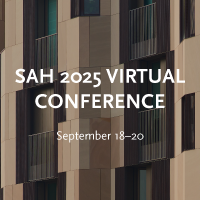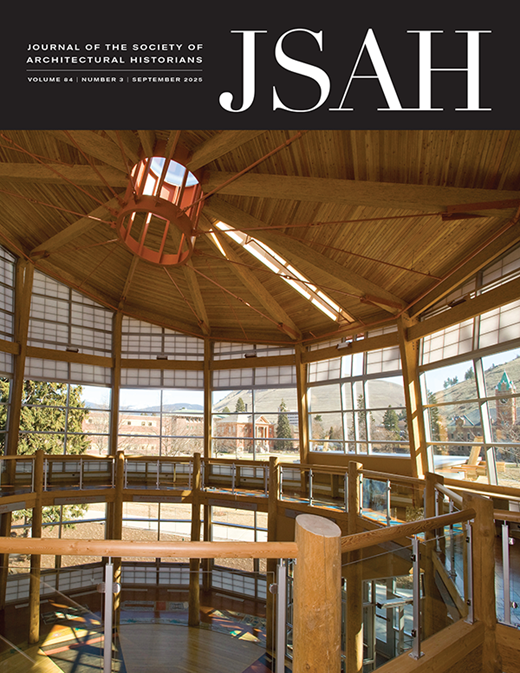Associate Professor Esra Akcan's article "Open Architecture, Rightlessness and Citizens-to-Come," appears in the new book Race and Modern Architecture: A Critical History from the Enlightenment to the Present (University of Pittsburgh Press, 2020), edited by Irene Cheng, Charles L. Davis II, and Mabel O. Wilson.
The book traces how race — defined as a concept of human difference that establishes hierarchies of power and domination — has played a critical role since the Enlightenment in the development of modern architectural discourse and practice in Europe and North America. According to a press release, the contributing authors challenge the standard association of modern architecture with "a universal project of emancipation" and reveal the largely unexplored influence race has had on the discipline. The book comes out of a conference held with the same title at Columbia University in 2016.
Akcan is the Michael A. McCarthy Professor of Architectural History in the Department of Architecture. She is the 2019–2020 Frieda L. Miller Fellow at the Radcliffe Institute for Advanced Studies at Harvard University, as well as the winner of the 2019 Research Prize from the Canadian Center for Architecture, and the 2016–17 Berlin Prize from the American Academy in Berlin.
In the early 1970s, Der Speigel compared Berlin's Kreuzberg to New York City's Harlem and warned of a "Turkish Ghetto."
"How did a New York neighborhood known for racism against its African American population become a metaphor to describe a district known for its Turkish guest workers in Berlin?" Akcan asks.
She points out "the explanatory power of racism in historicizing the discrimination against people who came to Germany through the guest worker program in the 1960s and 1970s." Her essay contributes to this discussion by reviewing some of the issues in her book Open Architecture: Migration, Citizenship and the Urban Renewal of Berlin-Kreuzberg (Birkhäuser-De Gruyter, 2018) — a critical investigation of how "socially and geopolitically constructed hierarchies about immigrants" operated in and through architecture, particularly by focusing on the urban renewal of Berlin's Kreuzberg neighborhood, known as IBA-1984/87.
"Many of the scholars who contributed to Race and Modern Architecture and I have been working on issues of racial and ethnic discrimination, colonialism, and resistance for years," Akcan said. "The fact that the publication of the book coincided with the recent events in the U.S. is yet another reminder of the longstanding problems that this country and many others around the world face. However, we too often hear and read comments that racism does not have much to do with buildings or architectural education. I hope this book will make visible the implicit and explicit ways that discrimination works as an underlying condition and is perpetuated in physical space. I also hope it will have an impact on mobilizing the necessary social and institutional changes that should extend to the architectural profession and education as well."
As a Radcliffe fellow, Akcan conducted research toward her new book, Right to Heal, which will explore the role of architecture following the upheaval of a crisis such as state violence, forced migration, epidemic, economic meltdown, or environmental disaster. In February, Akcan gave a talk on police violence and resistance at Harvard, and in April, her Radcliffe interview "How to Build a Better World" focused on the COVID-19 pandemic.
Both Open Architecture and Race and Modern Architecture were funded in part by grants from the Graham Foundation. Other contributors include Adrienne Brown, Luis Carranza, Jiat-Hwee Chang, Mark Crinson, Kenny Cupers, Addison Godel, Dianne Harris, Andrew Herscher, Reinhold Martin, Brian McLaren, Joanna Merwood-Salisbury, Peter Minosh, Adedoyin Teriba, and Lisa Uddin.
Co-editor Mabel O. Wilson gave the lecture "Memory/Race/Nation: The Politics of Modern Memorials" at AAP in October 2019. She is the Nancy and George E. Rupp Professor in Architecture and also a professor in African American and African diasporic studies at Columbia University. In May, Wilson gave an unflinching critique of traditional architectural pedagogy in an interview to architecture alumnus and National Organization of Minority Architects president Kimberly Dowdell (B.Arch. '06).
By Patti Witten
Read full article with additional links here
Esra Akcan has been an SAH member since 1999, and has served on the Membership & Diversity Committee.


